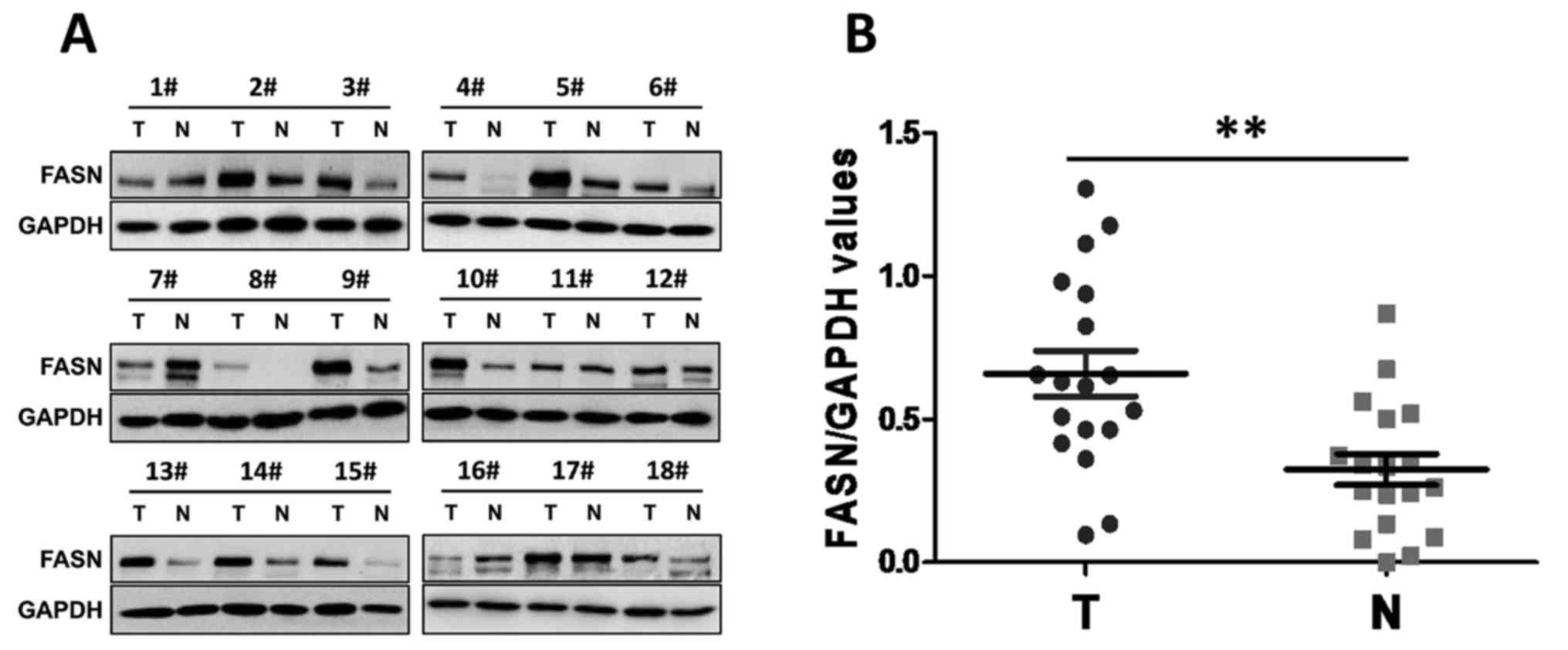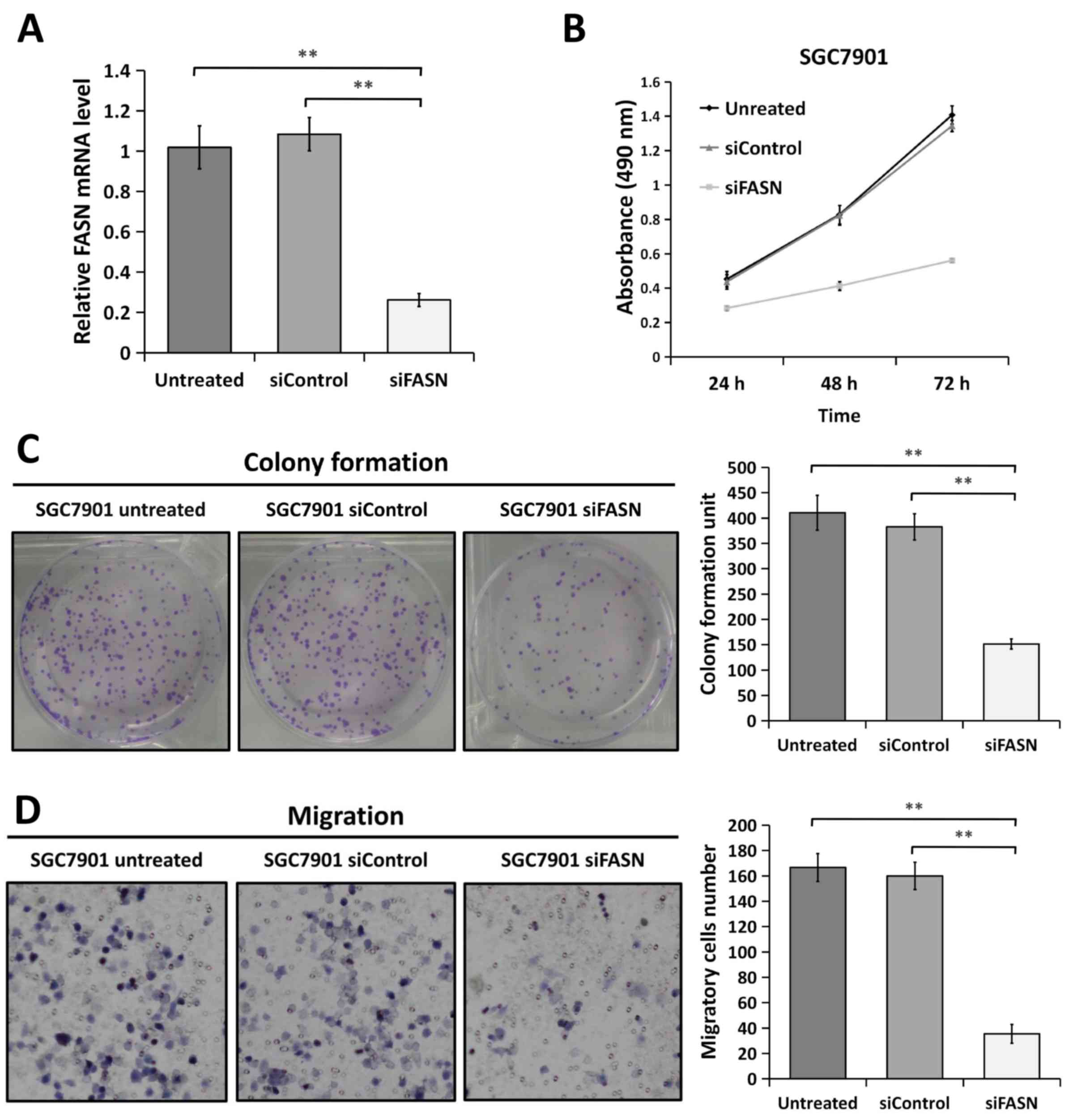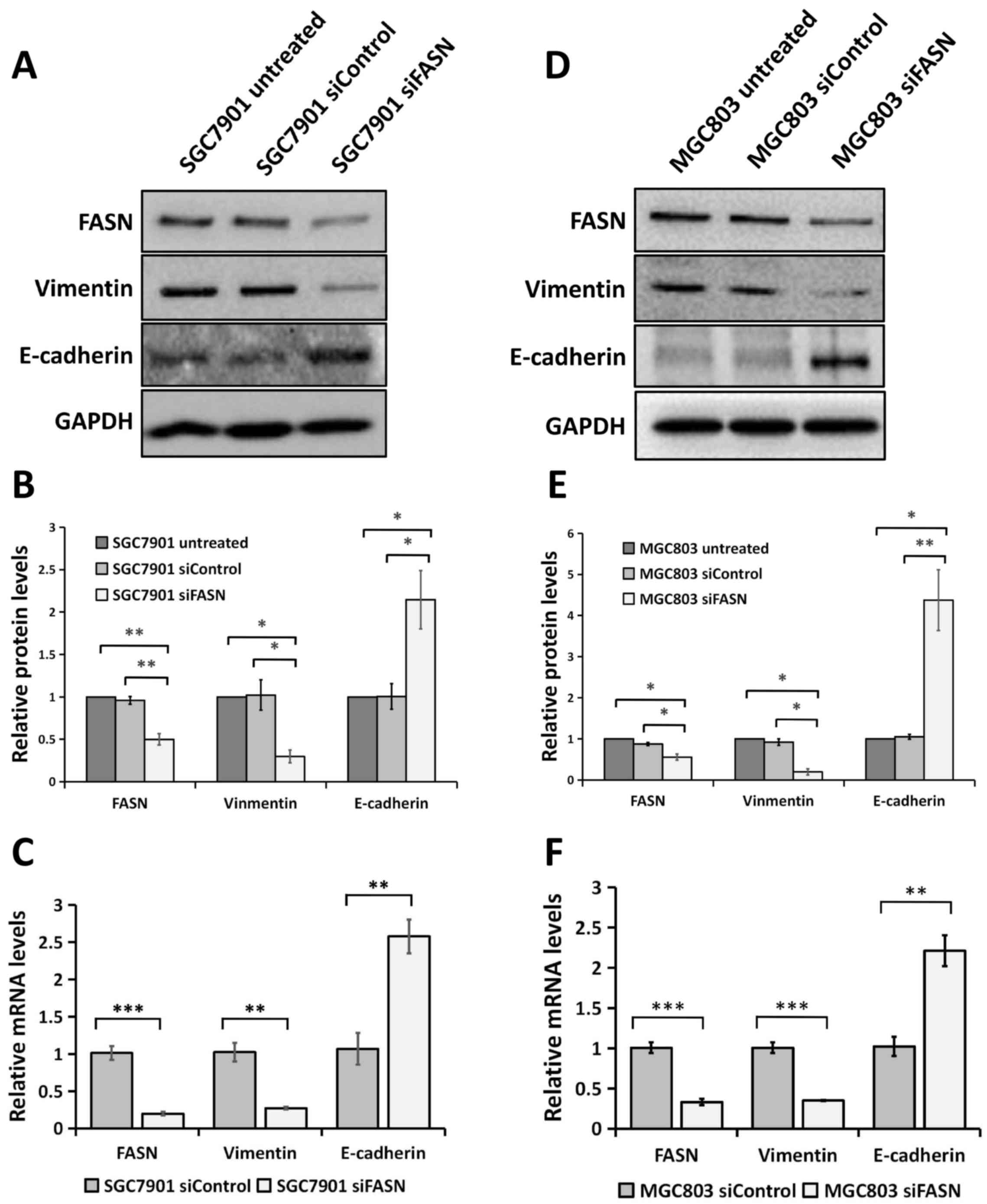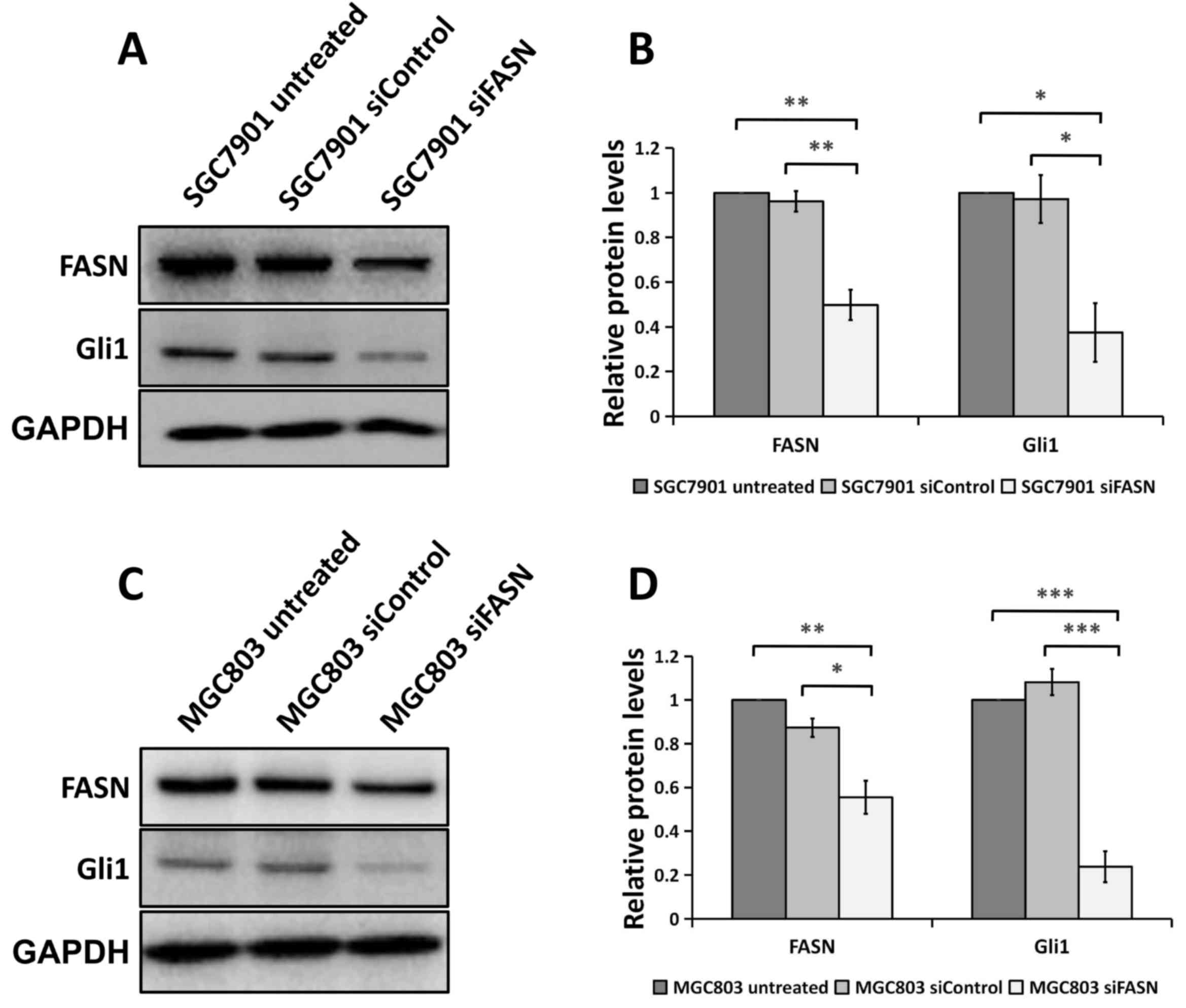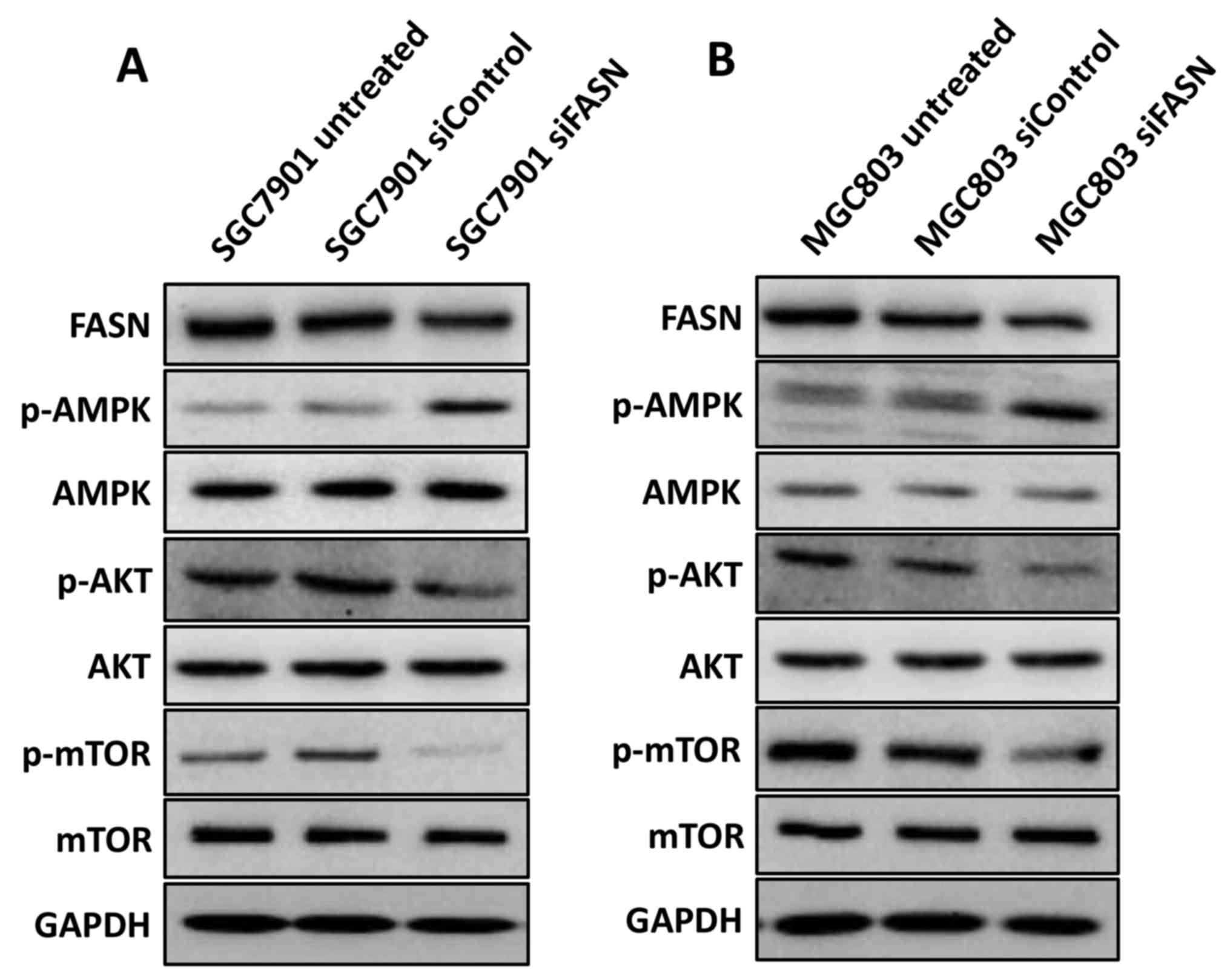|
1
|
Van Cutsem E, Sagaert X, Topal B,
Haustermans K and Prenen H: Gastric cancer. Lancet. 388:2654–2664.
2016. View Article : Google Scholar : PubMed/NCBI
|
|
2
|
Ferlay J, Steliarova-Foucher E,
Lortet-Tieulent J, Rosso S, Coebergh JW, Comber H, Forman D and
Bray F: Cancer incidence and mortality patterns in Europe:
Estimates for 40 countries in 2012. Eur J Cancer. 49:1374–1403.
2013. View Article : Google Scholar : PubMed/NCBI
|
|
3
|
Gores GJ and Lieberman D: Good news-bad
news: Current status of GI cancers. Gastroenterology. 151:13–16.
2016. View Article : Google Scholar : PubMed/NCBI
|
|
4
|
Ferlay J, Soerjomataram I, Dikshit R, Eser
S, Mathers C, Rebelo M, Parkin DM, Forman D and Bray F: Cancer
incidence and mortality worldwide: Sources, methods and major
patterns in GLOBOCAN 2012. Int J Cancer. 136:E359–E386. 2015.
View Article : Google Scholar : PubMed/NCBI
|
|
5
|
Shridhar R, Almhanna K, Hoffe SE, Fulp W,
Weber J, Chuong MD and Meredith KL: Increased survival associated
with surgery and radiation therapy in metastatic gastric cancer: A
surveillance, epidemiology, and end results database analysis.
Cancer. 119:1636–1642. 2013. View Article : Google Scholar : PubMed/NCBI
|
|
6
|
Califano D, Pignata S, Losito NS, Ottaiano
A, Greggi S, De Simone V, Cecere S, Aiello C, Esposito F, Fusco A
and Chiappetta G: High HMGA2 expression and high body mass index
negatively affect the prognosis of patients with ovarian cancer. J
Cell Physiol. 229:53–59. 2014.PubMed/NCBI
|
|
7
|
Bi X, Rexer B, Arteaga CL, Guo M and
Mahadevan-Jansen A: Evaluating HER2 amplification status and
acquired drug resistance in breast cancer cells using Raman
spectroscopy. J Biomed Opt. 19:0250012014. View Article : Google Scholar : PubMed/NCBI
|
|
8
|
Koochekpour S, Majumdar S, Azabdaftari G,
Attwood K, Scioneaux R, Subramani D, Manhardt C, Lorusso GD,
Willard SS, Thompson H, et al: Serum glutamate levels correlate
with gleason score and glutamate blockade decreases proliferation,
migration, and invasion and induces apoptosis in prostate cancer
cells. Clin Cancer Res. 18:5888–5901. 2012. View Article : Google Scholar : PubMed/NCBI
|
|
9
|
Jiang L, Xiao L, Sugiura H, Huang X, Ali
A, Kuro-o M, Deberardinis RJ and Boothman DA: Metabolic
reprogramming during TGFβ1-induced epithelial-to-mesenchymal
transition. Oncogene. 34:3908–3916. 2015. View Article : Google Scholar : PubMed/NCBI
|
|
10
|
Zadra G, Photopoulos C, Tyekucheva S,
Heidari P, Weng QP, Fedele G, Liu H, Scaglia N, Priolo C, Sicinska
E, et al: A novel direct activator of AMPK inhibits prostate cancer
growth by blocking lipogenesis. EMBO Mol Med. 6:519–538. 2014.
View Article : Google Scholar : PubMed/NCBI
|
|
11
|
Li L, Pilo GM, Li X, Cigliano A, Latte G,
Che L, Joseph C, Mela M, Wang C, Jiang L, et al: Inactivation of
fatty acid synthase impairs hepatocarcinogenesis driven by AKT in
mice and humans. J Hepatol. 64:333–341. 2016. View Article : Google Scholar : PubMed/NCBI
|
|
12
|
Li J, Dong L, Wei D, Wang X, Zhang S and
Li H: Fatty acid synthase mediates the epithelial-mesenchymal
transition of breast cancer cells. Int J Biol Sci. 10:171–180.
2014. View Article : Google Scholar : PubMed/NCBI
|
|
13
|
Grube S, Dünisch P, Frietag D, Klausnitzer
M, Sakr Y, Walter J, Kalff R and Ewald C: Overexpression of fatty
acid synthase in human gliomas correlates with the WHO tumor grade
and inhibition with Orlistat reduced cell viability and triggers
apoptosis. J Neurooncol. 118:277–287. 2014. View Article : Google Scholar : PubMed/NCBI
|
|
14
|
Zaytseva YY, Rychahou PG, Gulhati P,
Elliott VA, Mustain WC, O'Connor K, Morris AJ, Sunkara M, Weiss HL,
Lee EY and Evers BM: Inhibition of fatty acid synthase attenuates
CD44-associated signaling and reduces metastasis in colorectal
cancer. Cancer Res. 72:1504–1517. 2012. View Article : Google Scholar : PubMed/NCBI
|
|
15
|
Duan J, Sun L and Liao W, Wu Z, Wang L and
Liao W: Overexpression of fatty acid synthase predicts a poor
prognosis for human gastric cancer. Mol Med Rep. 13:3027–3035.
2016. View Article : Google Scholar : PubMed/NCBI
|
|
16
|
Hou W, Fei M and Qin CY, Zhu X, Greshock
J, Liu P, Zhou Y, Wang H, Ye BC and Qin CY: High overexpression of
fatty acid synthase is associated with poor survival in Chinese
patients with gastric carcinoma. Exp Ther Med. 4:999–1004. 2012.
View Article : Google Scholar : PubMed/NCBI
|
|
17
|
Ito T, Sato K, Maekawa H, Sakurada M,
Orita H, Shimada K, Daida H, Wada R, Abe M, Hino O and Kajiyama Y:
Elevated levels of serum fatty acid synthase in patients with
gastric carcinoma. Oncol Lett. 7:616–620. 2014. View Article : Google Scholar : PubMed/NCBI
|
|
18
|
Gonzalez DM and Medici D: Signaling
mechanisms of the epithelial-mesenchymal transition. Sci Signal.
7:re82014. View Article : Google Scholar : PubMed/NCBI
|
|
19
|
Tania M, Khan MA and Fu J: Epithelial to
mesenchymal transition inducing transcription factors and
metastatic cancer. Tumour Biol. 35:7335–7342. 2014. View Article : Google Scholar : PubMed/NCBI
|
|
20
|
Taipale J and Beachy PA: The Hedgehog and
Wntsignalling pathways in cancer. Nature. 411:349–354. 2001.
View Article : Google Scholar : PubMed/NCBI
|
|
21
|
Fukaya M, Isohata N, Nakanishi Y, Aoyagi
K, Ochiya T, Saeki N, Yanagihara K, Nakanishi Y, Taniguchi H,
Sakamoto H, et al: Hedgehog signal activation in gastric pit cell
and in diffuse-type gastric cancer. Gastroenterology. 131:14–29.
2006. View Article : Google Scholar : PubMed/NCBI
|
|
22
|
Chong Y, Tang D, Xiong Q, Jiang X, Xu C,
Huang Y, Wang J, Zhou H, Shi Y, Wu X and Wang D: Galectin-1 from
cancer-associated fibroblasts induces epithelial-mesenchymal
transition through β1 integrin-mediated upregulation of Gli1 in
gastric cancer. J Exp Clin Cancer Res. 35:1752016. View Article : Google Scholar : PubMed/NCBI
|
|
23
|
Wang ZS, Shen Y, Li X, Zhou CZ, Wen YG,
Jin YB and Li JK: Significance and prognostic value of Gli-1 and
Snail/E-cadherin expression in progressive gastric cancer. Tumour
Biol. 35:1357–1363. 2014. View Article : Google Scholar : PubMed/NCBI
|
|
24
|
Yoo YA, Kang MH, Lee HJ, Kim BH, Park JK,
Kim HK, Kim JS and Oh SC: Sonic hedgehog pathway promotes
metastasis and lymphangiogenesis via activation of Akt, EMT, and
MMP-9 pathway in gastric cancer. Cancer Res. 71:7061–7070. 2011.
View Article : Google Scholar : PubMed/NCBI
|
|
25
|
Livak KJ and Schmittgen TD: Analysis of
relative gene expression data using real-time quantitative PCR and
the 2(-delta delta C(T)) method. Methods. 25:402–408. 2001.
View Article : Google Scholar : PubMed/NCBI
|
|
26
|
Grunt TW, Wagner R, Grusch M, Berger W,
Singer CF, Marian B, Zielinski CC and Lupu R: Interaction between
fatty acid synthase and ErbB systems in ovarian cancer cells.
Biochem Biophys Res Commun. 385:454–459. 2009. View Article : Google Scholar : PubMed/NCBI
|
|
27
|
Tomek K, Wagner R, Varga F, Singer CF,
Karlic H and Grunt TW: Blockade of fatty acid synthase induces
ubiquitination and degradation of phosphatidylinositol-3-kinase
signaling proteins in ovarian cancer. Mol Cancer Res. 9:1767–1779.
2011. View Article : Google Scholar : PubMed/NCBI
|
|
28
|
Wagner R, Stübiger G, Veigel D, Wuczkowski
M, Lanzerstorfer P, Weghuber J, Karteris E, Nowikovsky K,
Wilfinger-Lutz N, Singer CF, et al: Multi-level suppression of
receptor-PI3K-mTORC1 by fatty acid synthase inhibitors is crucial
for their efficacy against ovarian cancer cells. Oncotarget.
8:11600–11613. 2017. View Article : Google Scholar : PubMed/NCBI
|
|
29
|
Calvisi DF, Wang C, Ho C, Ladu S, Lee SA,
Mattu S, Destefanis G, Delogu S, Zimmermann A, Ericsson J, et al:
Increased lipogenesis, induced by AKT-mTORC1-RPS6 signaling,
promotes development of human hepatocellular carcinoma.
Gastroenterology. 140:1071–1083. 2011. View Article : Google Scholar : PubMed/NCBI
|
|
30
|
Zheng SS, Gao JG, Liu ZJ, Zhang XH, Wu S,
Weng BW, Wang YL, Hou SC and Jiang B: Downregulation of fatty acid
synthase complex suppressed cell migration by targeting
phosphor-AKT in bladder cancer. Mol Med Rep. 13:1845–1850. 2016.
View Article : Google Scholar : PubMed/NCBI
|
|
31
|
Chang L, Wu P, Senthilkumar R, Tian X, Liu
H, Shen X, Tao Z and Huang P: Loss of fatty acid synthase
suppresses the malignant phenotype of colorectal cancer cells by
down-regulating energy metabolism and mTOR signaling pathway. J
Cancer Res Clin Oncol. 142:59–72. 2016. View Article : Google Scholar : PubMed/NCBI
|
|
32
|
Shimobayashi M and Hall MN: Making new
contacts: The mTOR network in metabolism and signalling crosstalk.
Nat Rev Mol Cell Biol. 15:155–162. 2014. View Article : Google Scholar : PubMed/NCBI
|
|
33
|
Teperino R, Aberger F, Esterbauer H, Riobo
N and Pospisilik JA: Canonical and non-canonical Hedgehog
signalling and the control of metabolism. Semin Cell Dev Biol.
33:81–92. 2014. View Article : Google Scholar : PubMed/NCBI
|
|
34
|
Wang Y, Ding Q, Yen CJ, Xia W, Izzo JG,
Lang JY, Li CW, Hsu JL, Miller SA, Wang X, et al: The crosstalk of
mTOR/S6K1 and Hedgehog pathways. Cancer Cell. 21:374–387. 2012.
View Article : Google Scholar : PubMed/NCBI
|
|
35
|
Furuta E, Pai SK, Zhan R, Bandyopadhyay S,
Watabe M, Mo YY, Hirota S, Hosobe S, Tsukada T, Miura K, et al:
Fatty acid synthase gene is upregulated by hypoxia via activation
of Akt and sterol regulatory element binding protein-1. Cancer Res.
68:1003–1011. 2008. View Article : Google Scholar : PubMed/NCBI
|
|
36
|
Bhatia B, Hsieh M, Kenney AM and Nahlé Z:
Mitogenic sonic hedgehog signaling drives E2F1-dependent
lipogenesis in progenitor cells and Medulloblastoma. Oncogene.
30:410–422. 2011. View Article : Google Scholar : PubMed/NCBI
|
|
37
|
Bhatia B, Potts CR, Guldal C, Choi S,
Korshunov A, Pfister S, Kenney AM and Nahlé ZA: Hedgehog-mediated
regulation of PPARγ controls metabolic patterns in neural
precursors and shh-driven medulloblastoma. Acta Neuropath.
123:587–600. 2012. View Article : Google Scholar : PubMed/NCBI
|















